七年级下第五单元
第五单元复习备考攻略+++2022-2023学年统编版语文七年级下册

第五单元——2022-2023学年人教部编版语文七年级下学期期末复习备考攻略重难点攻略一、请给下面加点的汉字注音。
瀑.布( pù)迸.溅( bènɡ)绽.放( zhàn )伶仃..( línɡ dīnɡ)穗.( suì)酿.( niàng )伫.立( zhù)忍俊不禁.( jīn )盘虬.卧龙( qiú)仙露琼.浆( qiónɡ)矜.持( jīn )摇撼.( hàn )拱.(ɡǒnɡ)淅淅沥..沥( xī lì)恍.然( huǎnɡ)马嵬.坡( wéi )忏.悔( chàn )欲绽.( zhàn )猥琐..( wěi suǒ)幼稚.( zhì)赤裸.( luǒ)服侍.( shi )忧郁.( yù)瞬.息( shùn )幽寂.( jì)涉.足( shè)萋萋..( qī)延.绵( yán )二、解释下面的词语。
迸溅:向四处溅。
稀落:稀稀疏疏,出现的少。
伶仃:孤独,没有依靠。
挑逗:逗引,招惹。
仙露琼浆:形容鲜美的酒。
盘虬卧龙:回旋盘绕像卧着的龙。
形容枝干苍劲有力。
伫立:长久地站立。
孱头:软弱无能的人。
矜持:拘谨,拘束。
楚楚:娇弱柔美。
垂垂暮老:形容像老人一样没有生气。
忏悔:认识了过去的错误或罪过而感觉痛心。
猥琐:(容貌、举止)庸俗不大方。
含贬义。
赤裸:光着身子,不穿衣服。
忧郁:忧伤愁闷。
镇静:情绪稳定或平静。
瞬息:一眨眼一呼吸的短时间。
怀恋:怀念。
涉足:指进入某种环境或范围。
伫立:长时间地站着。
萋萋:形容草长得茂盛的样子。
污染:有害物质混入空气、土壤、水源等而造成危害。
这里指路上没有留下脚印。
延绵:延续不断。
三、文学常识1.宗璞,1928年生,女,原名冯钟璞。
主要作品有短篇小说《红豆》《弦上的梦》《桃园女儿嫁窝谷》《后门》《知音》,中篇小说《三生石》等。
部编版语文七年级下册第五单元知识点
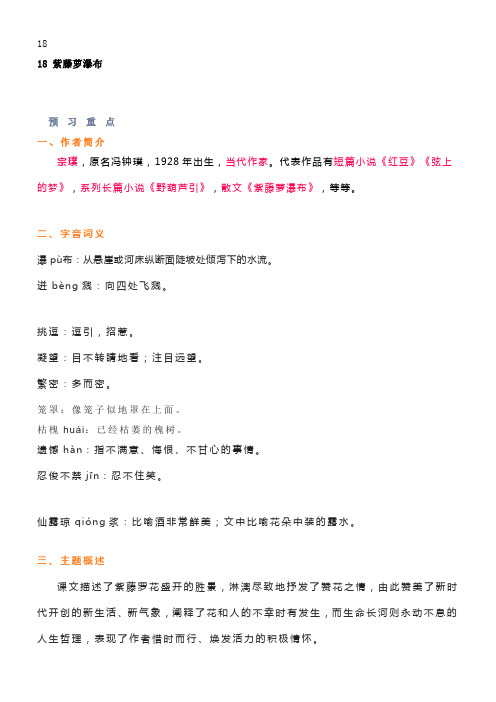
1818 紫藤萝瀑布预习重点一、作者简介宗璞,原名冯钟璞,1928年出生,当代作家。
代表作品有短篇小说《红豆》《弦上的梦》,系列长篇小说《野葫芦引》,散文《紫藤萝瀑布》,等等。
二、字音词义瀑pù布:从悬崖或河床纵断面陡坡处倾泻下的水流。
迸bèng溅:向四处飞溅。
挑逗:逗引,招惹。
凝望:目不转睛地看;注目远望。
繁密:多而密。
笼罩:像笼子似地罩在上面。
枯槐huái:已经枯萎的槐树。
遗憾hàn:指不满意、悔恨、不甘心的事情。
忍俊不禁jīn:忍不住笑。
仙露琼qióng浆:比喻酒非常鲜美;文中比喻花朵中装的露水。
三、主题概述课文描述了紫藤罗花盛开的胜景,淋漓尽致地抒发了赞花之情,由此赞美了新时代开创的新生活、新气象,阐释了花和人的不幸时有发生,而生命长河则永动不息的人生哲理,表现了作者惜时而行、焕发活力的积极情怀。
四、文章结构第一部分(1~7):赏花。
写紫藤罗花盛开的状貌,抒发“我”赏花的喜悦之情。
第二部分(8、9):忆花。
写紫藤罗的芳香引出“我”的回忆。
第三部分(10、11):悟花。
写“我”由眼前繁盛而茂密的紫色瀑布思考领悟到的人生哲理。
五、鉴赏品读1.文章开头“我不由得停住了脚步”独立成段,有什么作用?“不由得”三个字,突出了作者的惊讶程度;“停住了脚步”是因为作者被紫藤萝花盛开的美景深深地吸引了。
这句话从侧面烘托出紫藤萝花的美丽,为下文写紫藤萝花的盛开设下悬念,引起读者的阅读兴趣。
2.赏析“只见一片辉煌的淡紫色,像一条瀑布,从空中垂下,不见其发端,也不见其终极”这句话。
运用比喻的修辞手,生动形地写出了紫藤萝花生长繁茂和气势盛大。
3.“仔细看时,才知那是每一朵紫花中的最浅淡的部分,在和阳光互相挑逗。
”品析“挑逗”一词的好处。
“挑逗”一词运用拟人的修辞手法,形象地写出了紫藤萝花在阳光下盛开的风姿,把紫藤萝花的活泼、顽皮、可爱表现了出来,表达了作者对紫藤萝花的喜爱之情。
完整版)人教版七年级英语下册第五单元知识点总结
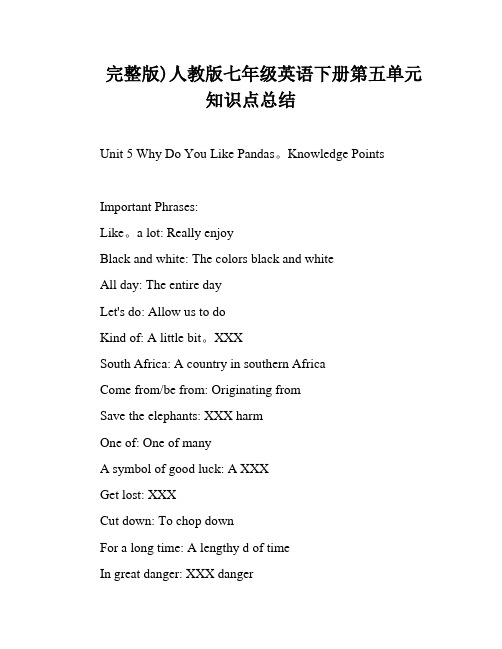
完整版)人教版七年级英语下册第五单元知识点总结Unit 5 Why Do You Like Pandas。
Knowledge PointsImportant Phrases:Like。
a lot: Really enjoyBlack and white: The colors black and whiteAll day: The entire dayLet's do: Allow us to doKind of: A little bit。
XXXSouth Africa: A country in southern AfricaCome from/be from: Originating fromSave the elephants: XXX harmOne of: One of manyA symbol of good luck: A XXXGet lost: XXXCut down: To chop downFor a long time: A lengthy d of timeIn great danger: XXX dangerXXX ivory: XXXPlaces with food and water: XXX sustenanceKill。
for: To take the life of an animal for a specific purpose1.Seeing Pandas: Observing pandas2.My Favorite Animals: XXX XXX3.e to SP: Greetings to SP4.e Back to SP: Greetings to SP upon returning5.From: Originating from6.In the Zoo: Located in a zoo7.On the Farm: Located on a farm8.My New Pet: XXX9.XXX: Bipedal movement10.Kind of: XXX11.Kind of Interesting: XXX12.A XXX: XXX13.A Little Boring: XXX14.A Kind of: A type of15.All Kinds of: Many different types of16.All Day: The entire day17.A Good Name for XXX: A fitting name for a person18.South Africa: A country in southern Africa19.South China: The southern n of China20.South America: The southern n of the Americas21.America。
七年级下册语文第五单元生字
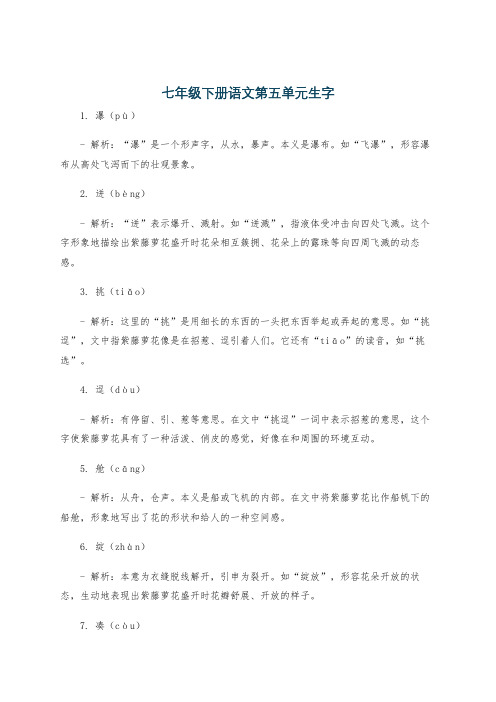
七年级下册语文第五单元生字1. 瀑(pù)- 解析:“瀑”是一个形声字,从水,暴声。
本义是瀑布。
如“飞瀑”,形容瀑布从高处飞泻而下的壮观景象。
2. 迸(bèng)- 解析:“迸”表示爆开、溅射。
如“迸溅”,指液体受冲击向四处飞溅。
这个字形象地描绘出紫藤萝花盛开时花朵相互簇拥、花朵上的露珠等向四周飞溅的动态感。
3. 挑(tiǎo)- 解析:这里的“挑”是用细长的东西的一头把东西举起或弄起的意思。
如“挑逗”,文中指紫藤萝花像是在招惹、逗引着人们。
它还有“tiāo”的读音,如“挑选”。
4. 逗(dòu)- 解析:有停留、引、惹等意思。
在文中“挑逗”一词中表示招惹的意思,这个字使紫藤萝花具有了一种活泼、俏皮的感觉,好像在和周围的环境互动。
5. 舱(cāng)- 解析:从舟,仓声。
本义是船或飞机的内部。
在文中将紫藤萝花比作船帆下的船舱,形象地写出了花的形状和给人的一种空间感。
6. 绽(zhàn)- 解析:本意为衣缝脱线解开,引申为裂开。
如“绽放”,形容花朵开放的状态,生动地表现出紫藤萝花盛开时花瓣舒展、开放的样子。
7. 凑(còu)- 解析:聚合。
如“凑上去”,表示靠近、聚集过去的动作,在文中用于描写人们观赏紫藤萝花时的行为。
8. 酿(niàng)- 解析:利用发酵作用制造酒、醋、酱油等。
也有比喻事情积渐而成的意思。
在文中“酒酿”是一种传统美食,同时“酿”字也赋予了紫藤萝花一种浓郁、醇厚的气息,好像花中蕴含着丰富的情感和生命力。
9. 发(fā)端。
- 解析:“发”在这里是开始、起始的意思。
“发端”即开端,这个词准确地描述了紫藤萝花从最初开始生长、开放的部位。
它还有“fà”的读音,如“头发”。
10. 终极(zhōng jí)- 解析:“终”表示最后、末了;“极”有尽头、顶点的意思。
“终极”就是最后的终点,文中用这个词来探讨生命的起点和终点的问题,表达对生命的思考。
(完整版)人教版七年级英语下册第五单元知识点总结

人教版七年级下册英语第五单元Unit5 Why do you like pandas? 知识要点重要短语like…a lot 非常喜欢… black and white 黑白相间 all day整天Let’s do= let us do 让我们做……kind of 有点儿,稍微 South Africa南非be from/come from 来自于save the elephants救助大象one of…其中之一a symbol of good luck好运的象征 get lost迷路 cut down 砍倒for a long time 很长时间in great danger处于(极大)危险之中things be made of ivory由象牙制成的东西 places with food and water有食物和水的地方kill……for……为……杀1.see the pandas 看熊猫2.my favorite animals我最喜欢的动物3.welcome to sp 欢迎来某地4.welcome back to sp 欢迎回到某地5.be from 来自e from来自7.in the zoo 在动物园里8.on the farm 在农场里9.my new pet 我的新宠物10.walk on two legs 用两条腿走11.kind of有点12.kind of interesting有点有趣13.a little有点14.a little boring有点无聊15.a kind of一种16.all kinds of 各种各样的17.all day整天18.a good name for sb对某人是一个好名字19.South Africa南非20.South China华南21.South America南美洲22.America, the USA美国23.the UK ,England英国24.the South Pole南极25.what animals什么动物26.save the elephants挽救大象27.one of +n复数。
人教版七年级英语(下册)Unit 5词汇、句型精讲
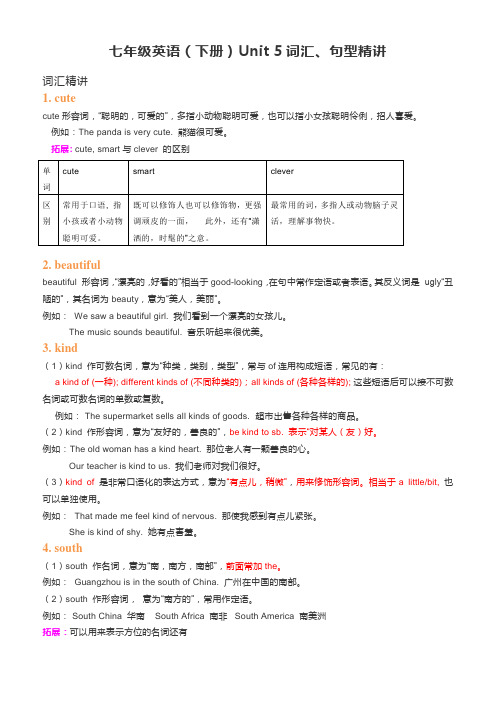
east(东),west(西),north(北), southeast (东南)southwest(西南), northwest (西北),northeast (东北)。
5. sleep(1)sleep作动词,意为“睡,睡觉”,指睡,睡着的全过程,强调睡眠的持续状态,后面可以跟副词或者介词。
例如:Don’t cry, the baby is sleeping. 别哭,那个婴儿在睡觉。
I can’t sleep because of the noise. 嘈杂声吵得我睡不着觉。
Did you sleep well last night? 你昨晚睡得好吗?(2)sleep 做名词,意为“睡觉,睡眠”,常为不可数名词。
但sleep前面有形容词时,可在前面加上a (an), 表示“一段……睡眠”。
词组go to sleep意为“入睡,睡着”。
例如:I need to have some sleep. 我需要睡一会儿。
Did you have a good sleep last night? 你昨天晚上睡得好吗?(3)asleep和sleepy 都是sleep的形容词形式。
asleep 表示“睡着的”,属于表语形容词,词组fall asleep 意为“睡着”;sleepy意为“困倦的,想入睡的”,既可以作定语也可以作表语。
例如:He fell asleep soon. 他很快睡着了。
I’m very sleepy. 我很困。
6. friendlyfriendly 是由名词friend + -ly 构成的形容词,意为“友好的”。
其反义词为unfriendly,意为“不友好的”。
例如:Chinese people are very friendly. 中国人民很友好。
类似的构词还有:love + -ly——lovely 可爱的mother + -ly —— motherly 母亲般的week + -ly —— weekly 每周的拓展:(1)be friendly to sb. 意为“对……友好”,指对别人态度好,热情;相当于“be kind to sb.”。
七年级语文下册_第五单元(单元总结)

七年级下册第五单元单元总结思维导图(一)知识导图(二)能力导图知能要点(一)知识要点【文学常识】1.《紫藤萝瀑布》选自《》,作者,原名冯钟璞,代表作品有短篇小说《》《弦上的梦》,散文《紫藤萝瀑布》,中篇小说《》等。
2.《一棵小桃树》作者,当代作家,代表作《》,获第七届茅盾文学奖。
3.《假如生活欺骗了你》作者, 国诗人。
代表作《》《致大海》《致恰达耶夫》。
4.《未选择的路》作者国诗人。
5.陈子昂,唐代文学家,初唐诗文革新人物之一。
6.《望岳》选自《杜诗详注》。
唐玄宗开元二十四年(736),杜甫曾在齐、赵(今山东、河北一带)漫游,故有此作。
7.王安石,字介甫,号半山,封荆国公,世人又称王荆公。
北宋著名政治家、思想家、文学家、改革家,唐宋八大家之一。
传世文集有《王临川集》《临川集拾遗》等。
8.陆游,南宋文学家、史学家、爱国诗人。
字务观,号放翁。
他具有多方面文学才能,尤以诗的成就为最,不仅成为南宋一代诗坛领袖,而且在中国文学史上享有崇高地位,是文学史上存诗最多的诗人。
9.龚自珍,字璱人,号定盦,清代思想家、文学家。
【字音字形】1.迸.溅( )2.挑.逗( )3.伶仃..( )( ) 4.伫.立( )5.忍俊不禁.( )6.níng()望7.fán()密8.lǒng()罩9.遗hàn() 10.仙露qióng()浆11.蜂围dié()阵12.酒niàng() 13.盘qiú()卧龙14.孱.头( ) 15.猥.琐( ) 16.摞.( ) 17.马嵬.坡( )18.灼.灼( ) 19.忏.悔( ) 20.矜.持( ) 21.褪.尽( )22.chàn()抖 23.赤luǒ() 24.miǎo()小 25.幼zhì()26.duō()嗦27.萋.萋( ) 28.瞬.息( ) 29.涉.足( )30.yōu()寂31.yōu()郁32.yán()绵【词语理解】1.船舱鼓鼓的,又像一个(忍不住笑)的笑容,就要绽开似的。
人教版七年级英语下册第五单元知识点总结
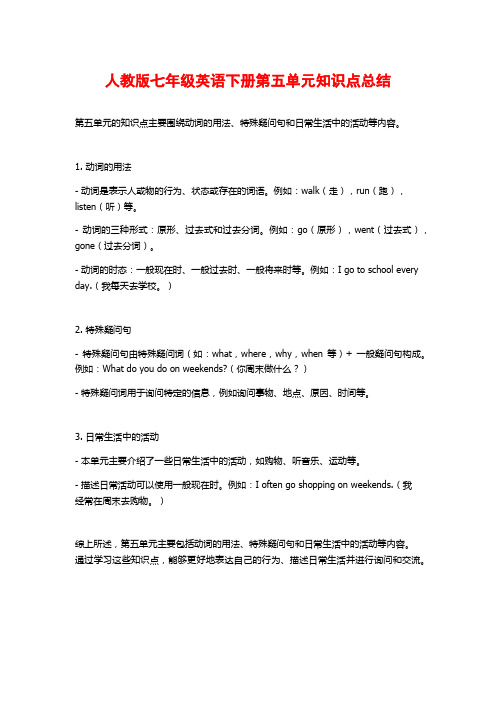
人教版七年级英语下册第五单元知识点总结
第五单元的知识点主要围绕动词的用法、特殊疑问句和日常生活中的活动等内容。
1. 动词的用法
- 动词是表示人或物的行为、状态或存在的词语。
例如:walk(走),run(跑),listen(听)等。
- 动词的三种形式:原形、过去式和过去分词。
例如:go(原形),went(过去式),gone(过去分词)。
- 动词的时态:一般现在时、一般过去时、一般将来时等。
例如:I go to school every day.(我每天去学校。
)
2. 特殊疑问句
- 特殊疑问句由特殊疑问词(如:what,where,why,when等)+ 一般疑问句构成。
例如:What do you do on weekends?(你周末做什么?)
- 特殊疑问词用于询问特定的信息,例如询问事物、地点、原因、时间等。
3. 日常生活中的活动
- 本单元主要介绍了一些日常生活中的活动,如购物、听音乐、运动等。
- 描述日常活动可以使用一般现在时。
例如:I often go shopping on weekends.(我
经常在周末去购物。
)
综上所述,第五单元主要包括动词的用法、特殊疑问句和日常生活中的活动等内容。
通过学习这些知识点,能够更好地表达自己的行为、描述日常生活并进行询问和交流。
- 1、下载文档前请自行甄别文档内容的完整性,平台不提供额外的编辑、内容补充、找答案等附加服务。
- 2、"仅部分预览"的文档,不可在线预览部分如存在完整性等问题,可反馈申请退款(可完整预览的文档不适用该条件!)。
- 3、如文档侵犯您的权益,请联系客服反馈,我们会尽快为您处理(人工客服工作时间:9:00-18:30)。
Unit 5 I'm watching TV. 单元测试一、根据句意及首字母提示完成单词(2分钟,5分)1. My sister likes r______ English stories.2. —What are you doing, Mary?—I’m c______ my desk.3. —May I come in?—S______, come in, please.4. —What are you doing, Mr Yang?—I’m w______ for my daughter.5. Let’s go to a movie. The TV s______ is too boring.二、用所给单词的适当形式填空(2分钟,5分)1. —What is she doing now?—She ______ (write) a letter.2. Look! A dog ______ (run) after a chicken.3. —When ______ you ______ (watch) TV?—In the evening.4. She wants ______ (talk) to me about London Olympics.5. Let’s _______ (take) a walk down the street.三、单项选择(2分钟,5分)()1. Don’t talk! The baby ______.A. sleepsB. is sleepC. sleepingD. is sleeping()2. Be quiet; she is talking ______ the phone.A. onB. inC. withD. to()3. Kate ______ the No. 12 bus here every morning.A. waitsB. is waitingC. is waiting forD. waits for()4. —Is your father watching Tom and Jerry?—______.A. Yes, he isB. Yes, he doesC. No, he isD. No, he doesn’t()5. —What ______ she ______?—She is working in the garden.A. do; doB. does; doC. is; doD. is; doing四、句型转换(3分钟,5分)1. She’s doing her homework. (改为一般疑问句)______ she ______ her homework?2. The Kings are learning to sing Beijing Opera.(对划线部分提问)______ ______ the Kings ______ ?3. I want to go to bed at 10: 00p. m. . (对划线部分提问)______ ______ you ______ to go to bed?4. My mum is talking to my teacher. (对划线部分提问)______ ______ your mum talking to?5. She takes a walk with her dog after dinner. (用now代替after dinner)She ______ ______ a walk with her dog now.五、完成句子(3分钟,10分)1. 女孩们正在干什么?______ ______ the girls ______ ?2. 他们在等校车。
They ______ ______ ______ the school bus.3. 孩子们正在谈论什么?What are the kids ______ ______?4. 詹妮正在擦黑板吗?______ Jenny ______ the blackboard?5. 让我们六点吃晚餐吧。
Let’s ______ dinner ______ 6:00p. m. .六、补全对话(4分钟,10分)A: Hello, David!B: Hello, Eric.A: David, what are you doing?B: 1A: Do you want to play ping-pong with me?B: Sorry, 2 What’s John doing?A: 3B: Well, are Jim and Tom learning Chinese, too?A: No, 4B: Well, I can play with you after the game. Can you wait?A: 5 Let’s meet at 9: 00, OK?B: OK, see you then.1. ______2.______3.______4.______5. ______七、完型填空(每题1分,共10分)Dear Bob,My name is Rich. I’m fourteen years old. I’m studying at a middle school. My school isnice 16 clean. There 17 30 students in my class. It’s 18 today. My classmates and I areplaying 19 the beach. It’s a nice place. Th e water is blue and clear. We are having a good time.There are 20 birds flying 21 the sea. Many people are swimming. There are some boys22 football. Other people are sitting on the beach. One girl is drawing a picture. 23 girl istaking photo s. I’m 24 to you ! What 25 you 25 now? I hope you get my letter soonand write back to me.Your sincerely,Rich( ) 16. A. and B. but C. so D. or( ) 17. A. have B. has C. are D. is( ) 18. A. sunny B. sun C. raining D. rain( ) 19. A. at B. in C. above D. on( ) 20. A. much B. a little C. a lot D. lots of( ) 21. A. on B. over C. in D. through( ) 22. A. playing B. are playing C. play D. to play( ) 23. A. Another B. The other C. The others D. Others( ) 24. A. calling B. talking C. flying D. writing( ) 25. A. did, do B. do, do C. are, doing D. will, be八、阅读理解(4分钟,10分)阅读理解(每题2分,共20分)AIn England people usually don’t talk very much. On a bus or a train, y ou can see everyone sits looking out of the window(看着窗外). And they often read books and newspapers. But they don’t talk much. When you meet English people, they often talk about one thing – the weather. So when you meet someone in England, you can say, ―It’s fine today, isn’t it?‖―But it was a little cold yesterday.‖ He may answer.―Oh, it will be warmer later!‖ you can say.Talk like this, and the English will think, ―How friendly you are!‖根据短文内容,完成下列句子( ) 26. In England people often on a bus or train.A. read booksB. read newspapersC. talk muchD. A and B( ) 27. When you meet English people, you can talk one thing--A. the newspaperB. the familyC. the weatherD. the books( ) 28. When you meet a young woman on a train, you can say,A. ―You are beautiful.‖B. ―It’s fine day today, isn’t it?‖C. ―How old are you?‖D. ―It’s very kind of you.‖( ) 29. The woman may answer, .A. ―Thank you.‖B.―I’m twenty—five.‖C. ―You are beautiful, too.‖D.―But it was a little cold yesterday‖( ) 30. If you talk about the weather with English people, they may think you are .A. friendlyB. friendC. beautifulD. GoodBIt is a Sunday morning .There are many children in the beautiful park . They are having a good time . Some are playing games under a big tree. Some are singing and dancing. Some boys and girls are running up the small hill. Others are boating(划船)on the lake.Where is Dick ? He is sitting b y the lake. What’s he doing? He is drawing.Look ! What is Jane doing? She is on the grass. She is running after a nice butterfly. She wants to get it.()31. It is today.A. Monday B Friday C. Sunday D. Saturday()32.The children under the big tree.A. are dancingB. are singingC. are running up the treeD. are playing games ()33.The children are boating .A. on the lakeB. in the riverC. on the hillD. under the tree()34.What is Dick doing ? .A. He is running after a birdB. He is singingC. He’s drawingD. He’s boating ()35.Where is Jane? .A. She’s in the boatB. She’s on the grassC. She’s by the lakeD. She’s on the hilCKate is a little girl. She’s only five. She is not at school. She doesn’t know how to read or write. But her sister Mary is a student. She knows how to read and write.One day, Mary sees her little sister in her room. She is at the table. There is a pencil in her hand(手). She is writing. ―What are you doing, Kate? ‖ She asks. ―I’m writing to my friend Rose, ‖ says Kate. ―But how can you? You don’t know how to write. ‖ says her sister. ―Well, ‖ says Kate,―It doesn’t matter (没关系). Rose doesn’t know how to write, either (也). ‖根据短文内容,回答下列问题。
